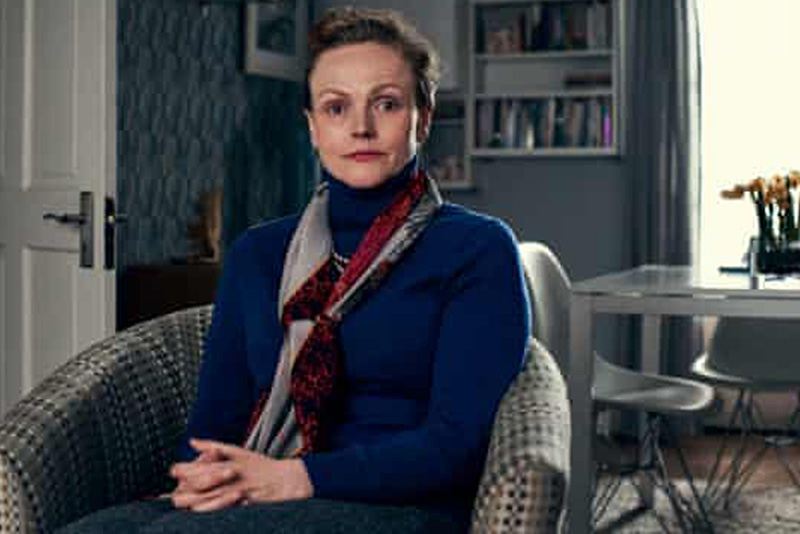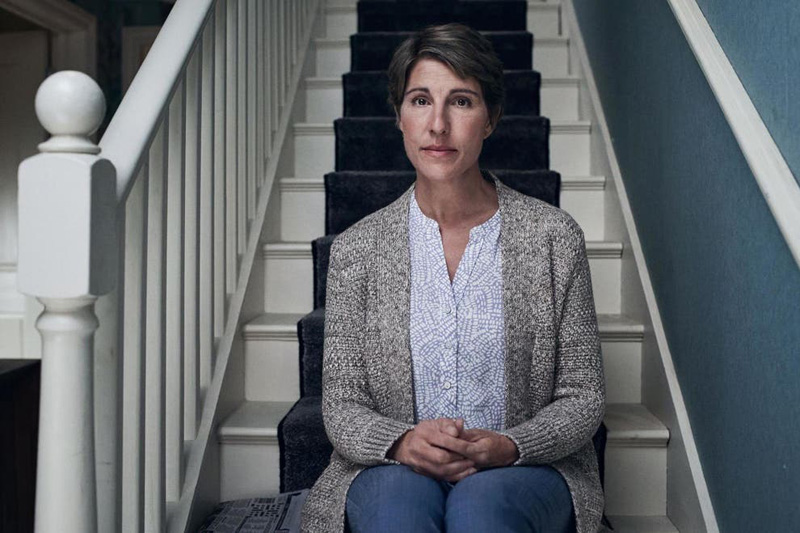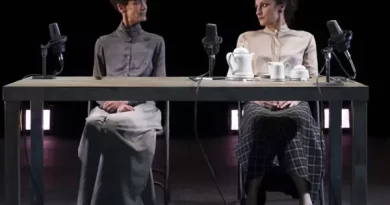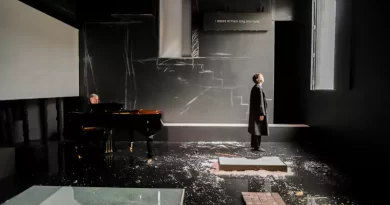“Nights in the Garden of Spain” and “Miss Fozzard Finds Her Feet”: Alan Bennett
Jay Paul Skelton at Alan Bennett’s Talking Heads: The Bridge Theatre
It’s notable how the Bridge Theatre’s production of Talking Heads, offering a well-curated collection of popular monologues by the much-loved playwright Alan Bennett, celebrated women in several ways. In terms of numbers, Playing Sandwiches (reviewed by Jeremy Malies) was the only one out of the eight selected by the Bridge to feature a male performer, in this instance the formidable Lucian Msamati. The ratio should come as no surprise given that all except two of the original BBC TV broadcasts of a dozen Talking Heads monologues in the 1980s and 1990s were performed by actresses, including the likes of Maggie Smith, Eileen Atkins, Penelope Wilton, and Julie Walters (while Bennett’s two additions to the series televised earlier this year were also written for women).

Maxine Peake in Miss Fozzard Finds Her Feet. Credit: BBC, Bridge Theatre, Zac Nicholson.
ln terms of the fictional characters included in this particular double bill, Rosemary in Nights in the Garden of Spain and Miss Fozzard in Miss Fozzard Finds Her Feet are two women who navigate what might be considered a fairly outlandish set of individual circumstances to emerge hopeful or triumphant in their own personal ways. And lastly, in this production at the Bridge we were not only in the expert hands of performers Tamsin Greig and Maxine Peake, but also directors Marianne Elliott and Sarah Frankcom. The monologues may have been written by a male playwright, but the double bill is a showcase for female talent in stories of middle-aged women belatedly forging their own paths.
Greig, as Rosemary in Nights in the Garden of Spain, the first story in this double bill, started on a surprisingly muted note in her performance, forgoing what l’ve seen on stage in the past as a ready playfulness. (She is best known for performing in a number of hit TV sitcoms.) lt stood in contrast to the increasingly sad and sordid details of a crumbling marriage, a seemingly justified murder, and the revelation of a suburban sexual underground. However, Greig’s approach paid dividends as the monologue continued by allowing us to see how such acts of (mostly male) aggression can chip away at one’s hopes for a brighter future.
In addition, by emphasizing the physical aspects of Rosemary’s loneliness, including a fearful stillness while perched on the sofa at the centre of Bunny Christie’s design, the physical transformation that came through an increasingly intimate relationship with a neighbouring abused wife became both clear and heart-breaking in Greig’s portrayal, it’s a testament to Greig’s versatility as a performer that she was able now and again to find the gentle humour of Rosemary’s predicament in a brief look to the audience or a small smile at the madness of it all.
Maxine Peake arrived on stage with no such subtlety as Miss Fozzard. She stood firmly centre stage as the lights rose, resplendent in the uniform of a sales associate in soft furnishings at Matthias Robinson, a small chain of department stores in northern England. Peake’s resolute stature. highly affected voice, and over-articulated delivery all but announced Miss Fozzard as the epitome of the indomitable British woman in that one could see her standing on the prow of a sturdy ship constructed in the storied yards of Liverpool. Peake also didn’t shy away from the comedy inherent in the series of misadventures focused on Miss Fozzard’s desire for a suitable replacement after her long-time chiropodist retires. Bennett’s narrative borders on the ridiculous, but Peake attacked it with her usual gusto and provided a number of solid belly laughs throughout the evening.
lt’s in sharp contrast to the quietude of Rosemary and Nights in the Garden of Spain, but there is a similar thread of loneliness in Miss Fozzard (who spends a lot of time looking after her disabled brother and has little social let alone romantic life), which Peake doesn’t ignore in her performance. lt’s what gave depth to the otherwise farcical developments in the late-burgeoning sexuality of Miss Fozzard’s relationship with her new chiropodist, and Peake’s wide smile at the close of the performance was both outrageous and completely reasonable.

Tamsin Greig in Nights in the Garden of Spain.
Credit: BBC, Bridge Theatre, Zac Nicholson.
There are of course many good gags. Lorna is nowhere near as demure as her subdued external manner and dowdy cardigan would suggest. She can be cynical and distrustful of authority figures. Asked if she might like to try counseling, Lorna responds in a flash: “Who does that, the RAC?” She is also onside with Bennett’s campaign against the mangling of the English language and is withering when people use the word “closure”. As with many of these monologues, a whole world is conjured for us such is Bennett’s art and we find ourselves analyzing the dynamics of relationships.
As with Playing Sandwiches from the other pair of monologues I saw, four-time-Olivier-winning designer Bunny Christie produces a symphony of greens for the road and foliage in all weathers. They are projected onto screens in Luke Hall’s video design which bookends major episodes in the narrative. George Fenton (who, incredibly, has been collaborating with Bennett since 1968 with music for the original Forty Years On) reflects Lorna’s isolation and desperate musings with stark chords in his original score. The play puts a new spin on the truism that none of us will ever truly know our spouses who often have secret lives.
This is a sadder play than Bed Among the Lentils, centering as it does on a betrayal that can’t even be thrashed out properly since the betrayer is dead. The image of Lorna using Cliff’s two crash helmets (the second had been hidden in his pannier and proved a surprise) as planter pots for the shrine she creates will haunt me as a study in grief. These two pieces contradict the current contrarian opinion that Bennett loathes his characters. A woman primarily stuck at home, venturing out occasionally and mourning a loved one is a play for our times.
Locked down again as I type this, I feel privileged to have seen four “Talking Heads” plays at this brave unsubsidized venue. It’s as though I committed a smash and grab raid on my trips to central London and came away with valuable spoils. Bennett’s understanding of human nature is remarkably broad, something that may be the first requirement of a playwright. His world is always credible and multi-faceted with depth but it’s a sombre place in which I wouldn’t want to tarry.









